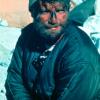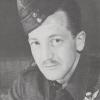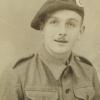LUIS DIMARCO – WW2 SERVICE HISTORY
Service No. 1426503
Parachute Regiment Association No. 17313
Having just turned age 19, I was conscripted to join the Army on the 19th February 1942. Issued with Service No. 1426503 I was sent to the Duke of Cornwall’s training centre on Bodmin moor for 3 months basic training.
All conscripts were given an intelligence test and after one month I was transferred to the Royal Corps of Signals, Signal Training Centre in Catterick, North Yorkshire. Although I excelled in my training I was sent back to Cornwall as it was explained to me that I could be deemed a security risk due to my parents being of Italian descent. Although bitterly disappointed with this decision, little did I know at the time that the training I received at the Signals Training Centre would stand me in good stead for my Army service ahead.
On returning to Bodmin Moor the only placements remaining were with the infantry and I ended up joining the Duke of Wellington’s regiment in Mid Wales.
I stayed there for several months, initially working as a Company Clerk to one of the Duke of Wellington's Company Commanders, later volunteering to attend a course to train as an Infantry Signaller.
It was during this time the Army were asking for Volunteers to join the Parachute Regiment. My application was accepted and I attended a 3 month period of intense training starting at Hardwick Hall, Derbyshire.
On the 2nd April 1943 I joined the 1st Battalion Parachute Regiment. My first posting was to sail to Algiers, North Africa, for the tail end of the Torch landings, under the command of Lt. Col. Alistair Pearson.
On my arrival there I was approached personally by Lt. Col. Pearson to conduct training sessions for partially trained up Signallers.
After about 3 months in North Africa, around July time, our assignment was to drop at Sicily to capture the Primosole Bridge, Catania but due to our (American) aircraft developing engine trouble we ended up flying back to North Africa.
Not having dropped in Sicily it was several weeks later that we sailed to Taranto Italy, later moving on to Foggia, and ending up in Barletta.
Sailing back from Italy the 1st Battalion were billeted at Bourne, Lincolnshire, England. I was billeted at Grimsthorpe Castle, a few miles from Bourne itself. Whilst at Grimsthorpe Castle I set up a telephone communication line from Grimsthorpe Castle into Bourne itself.
During the months that followed we were briefed for a drop in Rambouillet near Paris but that was cancelled.
It was in the September 1944 after several cancellations, Operation Market Garden was given the go-ahead and on the 17th December I parachuted onto the Arnhem drop zone.
After 9 days of fighting I was one of the lucky ones to cross the Rhine in one of the Canadian motor boats under Operation Berlin.
On returning from Arnhem after a period of leave I returned to Grimsthorpe Castle.
On the 8th May 1945 I flew to Denmark for VE Day to supervise the German surrender.
On my return I was promoted to Sergeant and attended a 3 months Signals Tutor Training Course at the Royal Corps of Signals.
The War had ended but those with War service remaining were being asked to go to Palestine for peace keeping duties, I therefore ended up finishing my War Service March 1946/November 1947 in Palestine as acting Signal Officer in charge of the Signal Platoon as we hadn’t been assigned a Signal Officer.
I have been asked how my time in Arnhem affected me on my return.
The period of time directly after Arnhem has always been a bit of a blank. I am told that I suffered nightmares but I wasn’t that aware of being anxious then.
Being young, still only 21, it was something you had to accept, you had been assigned to do a job. The fact we had failed and so many people had died and suffered and continued to suffer as a consequence was however very depressing but the war was still on. I had to continue my War service and returned to my Battalion billeted at Grimsthorpe Castle. I was promoted to Sergeant, attending a Signallers Tutor Training Course and finally being posted to Palestine.
After I was demobbed the ravages of the war, as far as I can remember, didn’t effect me too much but I can now put this down to having to accept what I and all those who served had experienced as our duty. My main aim after the war was to find suitable employment and I was lucky as I ended up finding a job I loved, staying with the same company employed as an Inspection Officer for what is now British Telecom for over 30 years.
Now much older and having read detailed information, watched documentaries and films associated with the battle of Arnhem I’ve felt more and realised more what we had to go through and the memories of my time at Arnhem have come back to me.
In more recent years, accompanied by my daughter, I returned to Arnhem to attend the Operation Market Garden Commemorations. Whilst there I was lucky enough to be taken around to try to trace back places where I had fought, enabling me to put some of my demons to rest, but not all!
On these visits we met and made friends with several Dutch people who looked after us and took us under their wing. More recently we befriended some young Dutch school.
On all my visits I never cease to be overwhelmed by the friendship and unconditional welcome I’ve received.
Source:
Angie and Louis DiMarco
Read More




Latest Comments
There are currently no comments for this content.
Add Comment
In order to add comments you must be registered with ParaData.
If you are currently a ParaData member please login.
If you are not currently a ParaData member but wish to get involved please register.